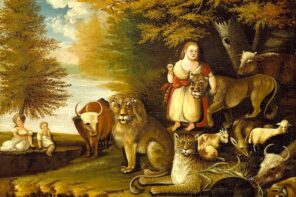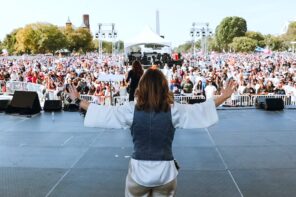The “Anba Dlo” water symposium held last weekend in New Orleans featured an unexpected alliance: representatives from Rand Corp, architects, environmentalists, policy specialists, and a Vodou priestess gathered in New Orleans to discuss new models of water management in Southern Louisiana.
The symposium, which coincided with the seventh annual Anba Dlo Halloween festival, is important for a city under the constant threat of flooding. (Anba Dlo is a Haitian creole term meaning “beneath the waters.”) But the symposium was also important moment for Afro-Caribbean religions in America. Festival organizer Sallie Ann Glassman received initiation as a Vodou priestess in Haiti. She has demonstrated that her religion can take a lead in civic engagement just like any other.
Vodou has long been a stigmatized religion in America. Early films like White Zombie (1932)––based on the sensationalistic writing of William Seabrook—presented Vodou as a sinister religion involving poison and mind control. When I ask my students to list their associations with Vodou, “scary” is the most common response. American fear and fascination with Vodou is also closely intertwined with issues of class and, especially, race. This matrix of associations is evident in the example of phone psychics like “Miss Cleo,” who uses an affected Caribbean accent. We also saw it in Pat Robertson’s gaffe following the earthquake that devastated Haiti in 2010, when he claimed that the nation of Haiti had made a pact with the Devil.
Glassman conforms to no stereotypes about Vodou. Born in Maine, her parents were of Ukrainian Jewish heritage but were not religious. She became interested in Vodou in the 1970s and received initiation in Haiti in 1995. Glassman is a vegetarian and does not allow animal sacrifice in her temple (common in some other Afro-Caribbean religions). She also designed and painted her own “New Orleans Voodoo Tarot Deck.” (Ina Johanna Fandrich uses the word “Voodoo” rather than “Vodou” to describe the uniquely New Orleanean fusion of traditional African elements with other spiritual influences.)
Glassman is also a social innovator. Ethnographies like Karen McCarthy Brown’s Mama Lola have already demonstrated how Vodou priestesses are a resource for the community they serve––acting like social workers and therapists as well as sources of supernatural guidance and power. But Glassman has endeavored to create a more institutional form of support. With her husband, a real estate developer, she created a community center after the destruction of Katrina. The “healing center” now houses a fitness center and a performing arts space as well as Glassman’s voodoo shop. The Anba Dlo festival is also intended as a philanthropy project that calls attention to an often ignored problem. At midnight, following the conference, Glassman held a ceremony to invoke “La Siren,”—the Haitian name for the Yoruba sea goddess Yemaja. The ceremony was partly to apologize to the goddess for damage caused by the BP oil spill of 2010, and partly to seek her guidance in finding better forms of water management.
Unlike private services like blessings and divination, invoking La Siren for a symposium on water management is an eminently social and even political act. Glassman explained, “As a priestess, it’s my work to bring balance and healing and wholeness to the community.” The sociologist Emile Durkheim argued that the key difference between magic and religion is that magicians have clientele rather than a church. The Anba Dlo festival is an index that Vodou has begun to enter the American mainstream. With resources not available to many Vodou practitioners, advocates like Glassman can demonstrate that Vodou is not merely a collection of magical practices, but a religious tradition complete with its own values and worldview.




